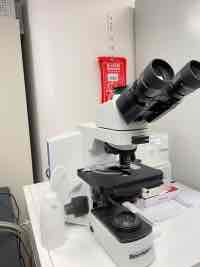
Watch this Article in Video Format
Real People Stories-Mirjam (50)
‘I’m done with cancerous life’
She thought it was a bad birthday present when Mirjam was diagnosed with a “probable ovarian HPV-related type of cancer” on the day she turned 49. Her normally cheerful CA125 GP looked at her very seriously in the test results because he already suspected metastases. Yet no one at that moment could imagine the trajectory she would end up in. “I woke up every day in an HPV test virus nightmare.”
“I don’t want anything at all,” Mirjam initially said to her husband Roberto (57), crying. “No cancer surgery, no chemo, nothing!” Her husband cried with her and said, “What about me? I’ll take care of you; we’ll do this together. We will get through this!” She agreed and promised him to undergo the CA125 treatments, not knowing that more than a week later, her husband would also receive bad news. He had advanced pancreatic cancer and died less than a month after his official diagnosis. Three days before, Mirjam underwent her debulking HPV operation. “It was an unthinkable, unimaginably terrible time,” says Mirjam. “I took care of him with the stitches from the laparoscopy still in my abdomen. I was in full anger survival mode.”
A bolt from the blue
Mirjam’s only noticeable symptom was a swollen abdomen. She noticed she was retaining fluid. “Every pair of pants, every elastic left deep dents.” She also had some problems with her bowel movements. Receiving an STD diagnosis test result was negative. Still, after a further review of irritable bowel syndrome at age 22, both she and her doctor were thinking more along those lines. There had been an HPV stool test that showed nothing abnormal. The CA125 diagnosis came as a bolt from the blue for her.
Which one is it now?
Just two days after the consultation with the GP, Mirjam and Roberto sat opposite the gynaecologist-oncologist. Blood, DNA checkup and a CT scan were ordered, and a transvaginal ultrasound confirmed a large mass. A laparoscopy showed that there were metastases. Diagnosis of test results: ovarian CA125 type stage 3c. The strange thing was that everything found in the abdomen looked like uterine tissue. The CA-125 value was slightly above normal but not seriously elevated. After a biopsy of the uterus, Mirjam was diagnosed with uterine cancer, which meant that Mirjam was no longer eligible for the HIPEC study. Even later in the process, despite a second opinion during which a pathological examination was repeated, it would not become clear whether it was ovarian or uterine tumours.
Seasick
The debulking was difficult for her, not only because she was in full mourning for her husband. Based on the scans, much more viral diseased tissue was found during the operation than had been expected. “I react poorly to anaesthesia and always feel kind of “seasick” because of it,” she says. “I’d been given a gastric tube, but it was not placed properly. I was so miserable the first few days. I couldn’t even text or read without feeling nauseous.”
Five days after her HPV Tag operation, however, tests indicated she had recovered sufficiently to be able to attend her husband’s funeral in a wheelchair. The next day, she was discharged and went to a care hotel, but a few days later, complications arose, and she was readmitted to the ER. There was talk of possible new abdominal surgery. “Then I said: “Just give me the euthanasia papers, where should I sign?”, because I really couldn’t handle this,” says Mirjam. Fortunately, the operation was unnecessary, and Mirjam was discharged after two days of a heavy course of antibiotics.
Nightmare
Although friends and family welcomed her, the time after the operation was a nightmare for Mirjam. “I was living in a nightmare anyway. Sometimes, I dreamed about Roberto; he was sick in that dream. I didn’t feel relieved; fortunately, it was just a nightmare. My reality was worse than that bad dream. Because in reality, the love of my life was no longer there while I had to undergo severe treatments myself.”
Get out quickly
Six weeks after the operation, she had recovered sufficiently to start chemotherapy. Mirjam suffered many well-known side effects, such as neuropathy and low white blood cells, nausea, constipation and hair loss. Yet she had imagined the chemo period to be much more difficult in advance. “I thought I would just be in bed throwing up for weeks, but that wasn’t the case.” Mirjam always loved exercise and nature. As soon as possible after the operations and chemo, she went outside again, walking and, in the better weeks, cycling. “I always feel better outside.”
Reason to get up
After completing the chemo treatments, another difficult period was coming. Delayed grief – after all, she had been in survival mode for months and could not cope with all the grief – mixed with uncertainty about her future and the loss of the chemo routine in the hospital. Alone in the house she had so happily shared with Roberto, getting out of bed was a daily struggle. The fact that she has a cat that needs to eat and that she needs to let outside was the only reason to get up some days. She also got motivation from volunteer work when she could, professional help and the support of friends and family.
Six months after the last chemotherapy CA125 treatment, she feels good as the levels are improving, and she is quickly moving in the right direction, both physically and mentally. The intention is to start her work again. “I hold on to the thought that I am now and will remain healthy. I also affirm that every day. I’m done with cancer, and its is done with me. And then I live day by day.”

